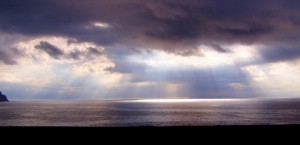
The God Archetype
This archetype arises out of the paradox of human existence. If an ancient human being saw a modern adult step out of a helicopter, talk to distant people using a small decorated ‘stone’ (mobile phone) they held in their hand, and produce images immediately using a digital camera or video, they would believe the person to be a god. The paradox is that what the ancient man or woman saw as a god is a fulfillment or projection of their own potential. The ancient human is the forebear of the modern person. They had the potential in them to become and develop what we are and have.
A fundamental process of what we call the mind or consciousness is to give form or words to abstract experiences or things sensed. When we dream this becomes amazingly obvious. The emotions, conflicts, sexual urges we feel are put into imagery and drama in our dreams. If we strip away the images we are left with raw feelings and urges. The dream imagery makes it all so much more memorable and clear. If we experience fear while we sleep that might be memorable. But if we dream of being chased by a two headed monster like a snake, that imagery sticks with our waking awareness with greater intensity.
The point being made is that even the most subtle things we sense ‘out of the corner of our eye’ as it were, can be dramatically represented in imagery either while awake or asleep. While awake such realisations are called visions, but are expressions of the same process. See: hallucinations and hallucinogens.
The development of self awareness presented the human animal with an enormous and perhaps traumatic change. Prior to having any sense of being a person, the early human being was constantly directed either by instincts or learned behaviour common to the group. They didn’t have to make decisions or think about what to do. Millions of years of experience had etched instinctive responses into them. Also, tens of thousands, or even millions of years of collective learned behaviour was passed on in the same way mammals pass on skills to their young. As an example of how this works, a wonderful study of the African wild dogs showed the its power. The dogs had been wiped out in a large area and attempts were being made to reintroduce them. A documentary film showed two packs of dogs. The one pack were established, and had arisen from an unbroken line of descent and social relationship for thousands of years. The second pack had been reared in captivity and released in the wild with some support. The descended pack showed enormous social skills in acknowledging and supporting each other’s rank, in working together to hunt, in feeding the pups and mutually caring for them, and in sharing food with those who stayed to care for the young.
The released pack didn’t have any of those skills. The information was not being passed on to them from a previous generation. They couldn’t work together. They fought amongst themselves instead of respecting leadership. They didn’t share food but fought over it. They all quickly died. The unspoken wisdom of generations had not been passed to them. They had no survival skills. Perhaps this reminds us of some people in our society today, and points to possible causes.
The arising of self awareness was like a massive new input impinging on this ready made wisdom early human beings lived with. When the split came and the new self awareness became more dominant there was a great sense of loss, and what had been an everyday part of them was now felt as distant or exterior to them. Because the instinctive or unconscious survival wisdom had been everything to them, their dream process of giving form to such an intangible, showed it as a great parental figure. It was the great Mother/Father out of which they had emerged. In fact becoming self aware was akin to being born, to emerging from an immense and ancient womb. This is clearly stated in story form in Genesis. It says, ‘And the eyes of them both were opened, and they knew that they were naked; and they sewed fig-leaves together, and made themselves aprons. And they heard the voice of Jehovah God walking in the garden in the cool of the day: and the man and his wife hid themselves from the presence of Jehovah God amongst the trees of the garden. And Jehovah God called unto the man, and said unto him, Where art thou’ And he said, I heard thy voice in the garden, and I was afraid, because I was naked; and I hid myself.’
Ancient races such as the Kalahari Bushmen in fact say their great fear is the loss of soul ‘ identity’ by being swallowed up again in unconsciousness. i.e. in loss of self awareness.Obviously this is conjecture, but it is conjecture based on anthropological studies, on the exploration of the deep unconscious in modern people, and in recovered experience from depth psychology.
The outcome in ancient and modern humans is that there is still a sense, an ‘out of the corner of the eye’ awareness of the enormous depths of mind within us shading right back to preconsciousness and even cellular life within. We sense this as the creative matrix out of which we have arisen. We sense it as having enormous potential. After all, if we have evolved from pre-conscious human animals, and they from ape like forms, a human could emerge from us that would be as god like to us as we would appear to an ancient predecessor. Therefore the god archetype is an expression of what we sense as our own potential and of the enormity of life and cosmic processes out of which we have existence.
The archetype itself, or what lies behind it, is beyond any one definition. But being what we are, and considering that we constantly try to define and give substance to such important processes, past cultures have given many forms and attributes to their expression of god or God. They have even at times defined aspects of what they experienced as the underlying forces of life and personal awareness, and we therefore have the gods and goddesses.
This archetype has a very powerful influence in everybody’s life simply because it is about our own fundamental potential and origins. How you relate to it shows the level of connection or conflict you have with your own resources and origins. It also shows how far you have come in your mature understanding of how your inner life functions. In some ways the difficulties and stages we go through in our relationship with our mother and father are similar to the acceptance, rejection, killing of, or deep dependence we have in relationship with what is called God. We may of course relate to this archetypal power in us like a child frightened of a parent; like an obedient child who wants to conform; like a rebellious child who seeks their own independence; like an angry or confused person who denies any link with their origins; like someone who has lost their memory, and so has no recognition of their ancestry; like an adult who has come to terms with their origins and has integrated into their own processes of mind and emotions, the matrix of strengths and weaknesses inherited.
None of us can escape the source of our own existence. There is nothing and nobody who is independent of the universe and its mysterious origins. We can, however, relate to it in many different ways. These ways are depicted in the New Testament as the manner in which people related to Christ. Taking Christ as a symbol of the cosmic web of sentient life, of our own innate potential,, people can love it, wash their hands of it, crucify it, ignore it, be healed by it, lie about it, offer themselves to it, worship it – and so on and on. The stance we take in our relationship with this larger life we are an integral part of, is the basic stuff of how we live, and the quality of our life.
Useful questions are:
Can I recognise that fundamentally my existence depends upon the creative processes of the universe, and that I am at base the potential of life?
How do I relate to that mystery of the divine or wondrous at the core of myself?
Am I taking responsibility for my own potential, or do I project it outwards as a god figure, or deny it all together?

